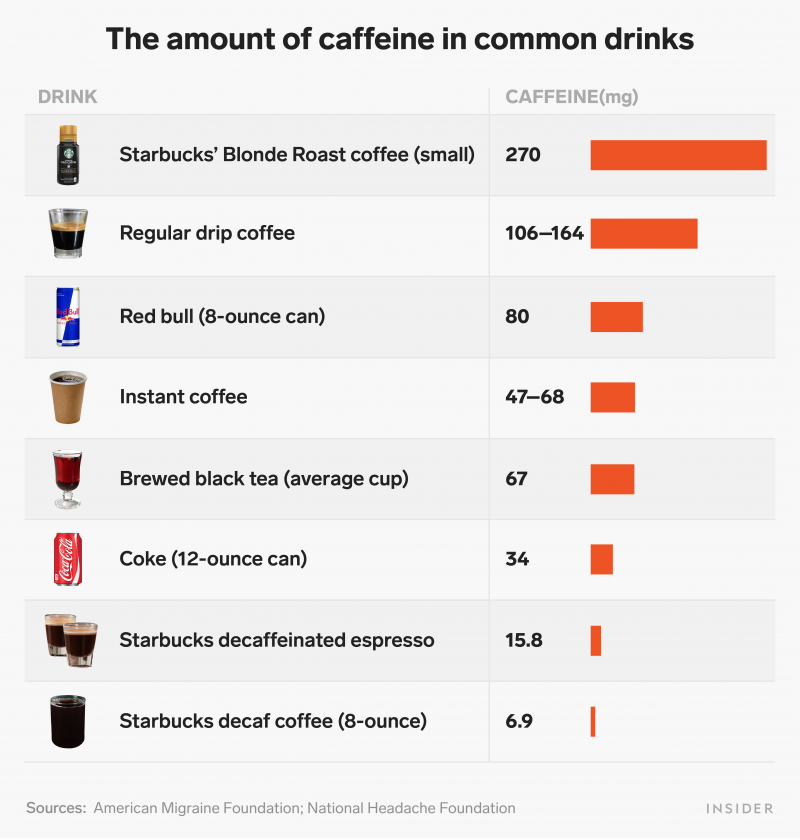- Drinking caffeine can either relieve headache pain or trigger it, depending on the amount you consume.
- Caffeine narrows blood vessels, which may relieve pain caused by some headaches, like migraines.
- However, if you become dependent on caffeine and stop drinking it, you may experience headaches as a result of caffeine withdrawal.
- This article was reviewed by Jason R. McKnight, MD, MS, a family medicine physician and clinical assistant professor at Texas A&M College of Medicine.
- Visit Insider’s Health Reference library for more advice.
Caffeine and headaches have a complicated relationship. In fact, caffeine can either relieve or trigger headaches, depending on how much of it you consume, and how frequently.
Caffeine – which is a central nervous system stimulant – turns up in soft drinks, sports drinks, coffee, tea, chocolate, and more, so it’s easy to see why 80% to 90% of all adults in North America consume it regularly.
Here’s everything you need to know about how caffeine can impact headaches and how much of it you should consume for positive effects.
Caffeine may help relieve headaches
The pain you experience with headaches – specifically migraines – is typically caused by the enlargement of blood vessels around your brain, which increases the amount of blood flow to your brain. This change in blood flow triggers a number of complicated mechanisms in the brain that can lead to headaches.
Caffeine narrows these blood vessels and is known to have "vasoconstrictive" properties. This means that it constricts vessels and reduces the blood flow to your brain, and as a result, it can help relieve migraine pain.
For example, a 2009 study published in the Human Brain Mapping Journal found that caffeine reduced cerebral blood flow - that's the blood supply to the brain - by an average of 27%.
In this way, caffeine can help stop you from developing migraines in the first place, as well as relieving pain once you already have one.
Caffeine can also help relieve headaches by improving the effectiveness of pain relief medication. In fact, it's a key ingredient in headache medications like Excerdine and Anacin, because it helps you absorb the active ingredients in the medication.
For example, a 2017 review published in The Journal of Headache and Pain studied the results of seven different controlled trials on patients who suffered from migraines or tension-type headaches over a 40-year period. The researchers found that over-the-counter pain relief medication containing caffeine works faster and more effectively than pain relief medication alone.
However, the science isn't clear cut. "There have been many conflicting studies about the link between headaches and caffeine intake," says Amy Stephens, MS, RDN, CDE, a licensed dietitian.
In fact, a 2016 study published in the Journal of Headache Pain found that when migraine patients stopped drinking caffeine - after drinking it every day - the medication, called triptans, they were taking for their migraines became more effective.
According to the American Migraine Foundation, whether caffeine can help headaches or migraines depends on how often you get them:
- If you suffer from episodic migraines - that's up to 14 headaches per month - caffeine can help, but only if you limit it to no more than 200mg a day. Anything above that increases your risk of developing more headaches or migraines.
- If you suffer from daily headaches, you should avoid caffeine completely - this is also recommended by the National Headache Foundation.
Caffeine can also trigger headaches
Drinking lots of caffeine won't help relieve a headache. For example, if you increase your caffeine intake, but don't increase how much water you're drinking, caffeine can trigger a headache indirectly by causing you to become more dehydrated.
However, you're more likely to get a headache from caffeine if you simply drink too much of it too often, because this can lead to dependence.
If you suddenly stop or reduce your caffeine intake after consuming it regularly - typically more than 200 mg per day for more than 2 weeks - you may feel the symptoms of caffeine withdrawal. According to the Diagnostics and Statistical Manual of Mental Disorders (DSM-5), headaches are the main symptom of caffeine withdrawal.
Caffeine narrows the blood vessels around your brain, so once you stop consuming it regularly, they expand. This causes a significant increase in blood flow to the brain, and that's what can lead to migraine headaches.
"If you want to get off caffeine, don't abruptly stop. Taper your intake gradually over a few days. This can help minimize the intense withdrawal headache," says Stephens.
According to the American Migraine Foundation, it's possible to avoid caffeine withdrawal symptoms by tapering down your intake to as little as 25 mg of caffeine a day.
How much caffeine you should consume to relieve headaches
Overall, Stephens says it's important to consume caffeine in moderation. That way, you can stave off any potential episodes of withdrawal.
"The right amount is under 400 mg of caffeine per day," says Stephens. That's around two to four cups of coffee, depending on how long it's brewed for, as well as how strong the coffee you're drinking is.

Takeaways
If you drink caffeine in moderation, it's unlikely to cause a headache, and it may actually help relieve pain if you suffer from occasional migraines.
But if you reduce your intake too drastically, it can trigger headaches as a symptom of caffeine withdrawal. And if you suffer from regular, or daily, headaches, it's best to avoid caffeine altogether.

